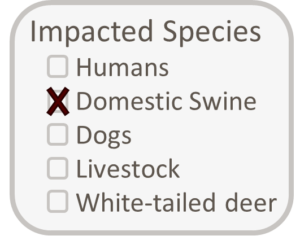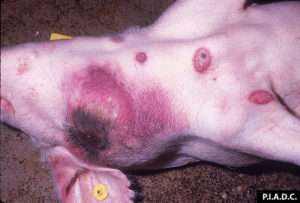 African Swine Fever (ASF) is caused by a highly infective virus native to the sub-Saharan region of Africa. The virus is believed to have originated in warthogs where it has limited effects on the host animal. The virus has since jumped to domestic pigs where it is highly contagious and very deadly. In 2007 the disease was accidentally introduced to the Eurasian continent and has been spreading through domestic swine operations and populations of Eurasian wild boar across Europe and Asia. At this time, ASF has not been identified in the United States. In June of 2021 the disease was identified near the United States in the Dominican Republic and in September was also identified in Haiti. Since ASF is considered a foreign animal disease, the United States Department of Agriculture is on high alert monitoring for signs of infection in the United States swine population, both domestic and feral.
African Swine Fever (ASF) is caused by a highly infective virus native to the sub-Saharan region of Africa. The virus is believed to have originated in warthogs where it has limited effects on the host animal. The virus has since jumped to domestic pigs where it is highly contagious and very deadly. In 2007 the disease was accidentally introduced to the Eurasian continent and has been spreading through domestic swine operations and populations of Eurasian wild boar across Europe and Asia. At this time, ASF has not been identified in the United States. In June of 2021 the disease was identified near the United States in the Dominican Republic and in September was also identified in Haiti. Since ASF is considered a foreign animal disease, the United States Department of Agriculture is on high alert monitoring for signs of infection in the United States swine population, both domestic and feral.

Deceased domestic pig with blotchy red skin caused by African swine fever. Photo by PIADC and Center for Food Security and Public Health at Iowa State University, College of Veterinary Medicine
This disease has no known effects for humans, but in swine can cause decreased appetite, blotchy red skin, weakness, diarrhea, vomiting, coughing, and difficulty breathing. In both domestic pigs and wild boars, the result of infection is often death. Both domestic and wild swine can be infected by exposure to bodily fluids from infected individuals, by consumption of infected feed and garbage feeding which includes pork meat scrapes, or by exposure to infected carcasses on the landscape. Additionally, people can transport or spread the virus on shoes or clothing worn in and around infected environments and infected meat products. At this time, there is no vaccination or treatment available, so sound biosecurity practices are the only tools available to slow and prevent the spread of this disease.
The following bio security recommendations are provided by the Texas Animal Health Commission
- Record keeping: Producers should maintain strict records of visitor traffic including personnel, vehicles and equipment on farms and at pig production facilities.
- Foreign visitors: Take caution when welcoming visitors who have previously been at swine facilities in countries where ASF is present. While stringent biosecurity practices aid in preventing the spread of ASF, it is not recommended to allow foreign visitors from ASF affected countries enter your swine facility.
- Control wildlife, rodents and pests: Wildlife and other pests can transmit many diseases and compromise biosecurity.
- Proper sanitation: Soap, chemicals, and drying of facilities are key components of a biosecurity plan that can keep the level of disease-causing pathogens to a minimum.
Click here for further biosecurity information from USDA and the Texas Animal Health Commission.